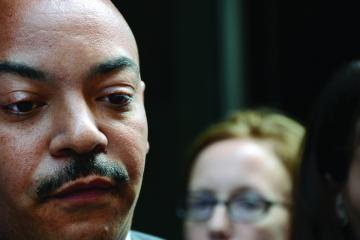Giving a Voice to Childhood Sex Abuse Victims
By John Loftus
On the heels of the conviction of a high-ranking Catholic church official, veteran attorneys and a victims' advocate encourage childhood sexual abuse victims to speak up. Be silent no more. Childhood sexual abuse victims should come forward and tell their stories, Philadelphia’s district attorney, Seth Williams, said on Tuesday. Williams was fresh off the conviction and sentencing of Monsignor William Lynn, the first high-ranking Roman Catholic Church official to be ordered to prison for protecting predator priests. Williams promised that if the crimes against children were committed within the statute of limitations, they will be prosecuted. Williams made the plea for more reporting in a news conference held outside the Criminal Justice Center where Lynn, 61, had just been sentenced to three to six years in prison for shielding a priest who had molested a child. Veteran attorneys and a victims’ advocate offered an even more aggressive view in interviews later in the week. They said victims shouldn’t worry about the statute of limitations, or even about gathering evidence against their abusers. “When you’re in pain and have lived in pain for years and you’re ready to disclose [how you were abused], almost any action beats no action at all,” said David Clohessy, executive director of the Survivors Network of those Abused by Priests. “What’s important it that you speak up, not that you speak up perfectly or thoroughly.” The statute of limitations, the law that lays out a deadline for when certain crimes may be prosecuted, is complicated for sex crimes, said James Carpenter, chief of the District Attorney’s Family Violence and Sexual Assault unit. In general, victims have up to age 50 in criminal cases and up to age 30 in civil cases. The statute has been amended, Carpenter said, so whether their abuse can be prosecuted is something victims should let the DA’s office figure out. Report the abuse; call the police, he said. Further, even if a crime is too old to yield an arrest, the molester named might already be the subject of a current prosecution and whatever information another victim discloses might help that case, Carpenter said. “Perpetrators typically have many victims,” said Marci Hamilton, an attorney who represents victims in eight civil cases against the Philadelphia Archdiocese. “Every report can help with corroboration in others cases.” “Don’t wait,” Clohessy said. Police might tell a victim they’ve had many complaints about a particular molester. It’s very rare that a molester has only one victim, Carpenter said. The average serial pedophile might have abused 80 to 100 children. Adults who were molested when they were children should put aside any misgivings about reporting their abuse because they don’t recall exact dates or don’t have a lot of information to give prosecutors, Clohessy said. “Prosecutors understand that victims are suffering, nervous and fearful of being disbelieved,” Clohessy said in a phone interview from his office in St. Louis. “So, they’re not put off by a victim saying ‘I don’t remember what year it was.’ ” Sexual-abuse investigators are trained in interviewing people who have survived that abuse, Hamilton said. “If the survivor has documentation regarding dates or locations, that can be helpful, but this is not necessary,” she said. Is disappointment possible? Yes. Charges have to be proved beyond a reasonable doubt, Hamilton said. “Sometimes, district attorneys will determine that, although they believe the survivor, there is not enough evidence to press criminal charges,” she said. And, sometimes, juries don’t convict. Still, Hamilton said, victims should report their abusers. “Child sex abusers don’t stop abusing simply because they age. Some abuse children into their 70s and 80s,” she said. “So any survivor who comes forward, even years after the abuse, can stop the perpetrator from harming another child.” People who were sexually abused when they were children often don’t come forward to report what happened to them until they are in their twenties or older, Carpenter said. They have children themselves, he said, and when they consider the vulnerability of their own children, they realize they want to report the people who abused them. They feel guilty, Carpenter said. “The reality is that it’s not right for them to carry that guilt.” Pennsylvania’s legislature, he said, recently approved legislation that will allow attorneys to call expert witnesses to testify about the behavior of the victims of child abuse. “We are the last state to have this,” he said. Prosecutors encounter many misconceptions about sexual abuse of children, he said. For example, molesters don’t look like monsters, and “they’re not stupid,” he said. People also expect to see evidence of physical injury to children who are raped or sodomized, he said, but that’s not always true. Only in a small percentage of cases in which a young girl is raped is the hymen damaged, he said. Also, “a lay person would expect if a nine-year-old is raped, he’s going to tell somebody,” but that isn’t always going to happen either, Carpenter said. Most victims know their abusers, Carpenter said. They might trust their molesters and don’t realize what is happening to them is wrong, so they don’t tell anyone. Or, perhaps, they are afraid of not being believed. And children who report abuse while they’re being abused sometimes take their stories back, he said. “Kids will recant because they want things to go back to normal,” he said. Parents don’t want to believe their children are being molested, and that helps the molesters, he said. “It’s hard to imagine that your husband or your boyfriend is doing something in your house,” Carpenter said. “These guys rely on this.”•• Are you a victim of sexual abuse? Call 911, or call the Philadelphia Police Department’s Special Victims Unit at 215-685-3251, or the Child Abuse Unit at 215-685-3268. Reach reporter John Loftus at 215 354-3110 or jlotfus@bsmphilly.com
|
.
Any original material on these pages is copyright © BishopAccountability.org 2004. Reproduce freely with attribution.
